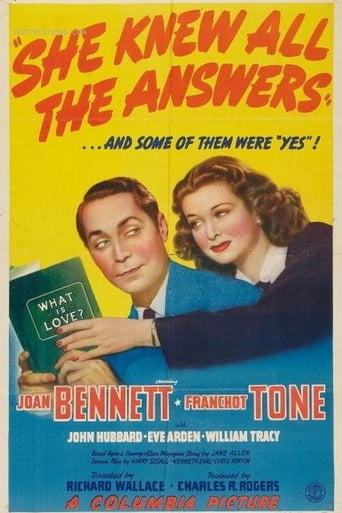mark.waltz
When a notorious showgirl manipulates her way into a receptionist position at a prestigious Wall Street investment firm, it's going to be a sticky situation for boss Franchot Tone. The showgirl is sultry Joan Bennett, engaged to Tone's ward (John Hubbard), determined to make a good impression on the boss and get his approval for marrying Hubbard. But he has no idea that this rather brash young woman is the one he's been trying to get Hubbard to break up with, so when she starts working for him, it's initially nothing but trouble. As always happens in these type of screwball comedy situations, the boss begins to get feelings for the screwball heroine, becomes screwball himself, lightens up to the foibles he faces with her, and ultimately ends with the film changing partners as they prepare for those wedding bell blues.You don't expect much realism in the screwball comedies of the 1930's and 40's, but one thing you do expect is consistency in character, and for Tone's stodgy Wall Street investor, he splits his personality up into two parts. Bennett, initially finding issues with her switchboard operating machine just like Rosalind Russell did in "Auntie Mame", might be great in the nightclub, but as a switchboard operator, she wouldn't last an hour in most firms. The wrong use of an important word in the banking industry causes Tone and other investors to lose thousands of dollars, and her easy going manner allows a mousetrap salesman to irritate Tone and secretary Almira Sessions with his odd invention that nearly electrocutes Tone. Once he changes his tune towards Bennett, he tries to help her allegedly ailing sister Eve Arden learn to walk again, which leads to a very funny moment where Hubbard poses as a temperamental cook to prevent Tone from discovering his presence. I expected so much more from this screwball comedy which came from Columbia, a major creator of many of the best of them. In fact, I could have easily seen Rosalind Russell in this part, needing a break from her career women roles to play someone a bit zanier, and foreshadowing her similar situation 16 years later in "Auntie Mame". That is not to say that Bennett isn't good in this film. She is actually quite good, showing her comic abilities throughout. However, I just didn't buy her and Tone ending up together, even though in a final burst of comic genius, the writers had their conscience appearing to each of the characters. Arden unfortunately does not get a lot of good material as far as her usual wisecracks are concerned. Her character does more physical reacting than verbal reacting. Thurston Hall and Grady Sutton give amusing performances in smaller comic roles, and so therefore the fault of this being a disappointment does not lie among the cast, but the writers who took major liberties with creating a remotely believable situation.
rc_brazil
I watched this without great expectations and figured I'd comment on it here since there are no reviews available as of this writing. The story is rather simple; Joan Bennett is a chorus girl engaged to a rich playboy. The playboy is threatened with disinheritance if he marries her. In order to gain the playboy's guardian's approval, she starts to work for him as a secretary/telephone operator. The guardian happens to be Franchot Tone, and the rest, as they say, is history. It's predictable, but Eve Arden is fun (as always) as Bennett's best friend and room mate and Bennet and Tone have nice chemistry. Overall, it is not a bad way to spend a lazy afternoon.


